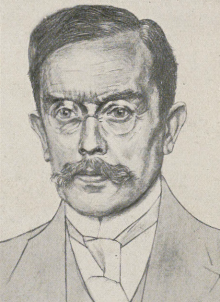The P.C. Boutens Collection > Biography
P.C. Boutens (1870-1943)
Pieter Cornelis Boutens was born in Middelburg (Zeeland) on February 20, 1870. After attending high school, he studied Latin and Greek at Utrecht University. While still a student, he had his first poems published in the Utrechtsche Studenten-Almanak (Utrecht Students Almanac). After completing his studies, his ‘grand seigneur’ lifestyle forced him to look for work. In 1894, he was appointed to the post of classical languages teacher at the Noorthey elite boys’ boarding school in Voorschoten.
Books of poetry and translations
Boutens remained preoccupied by poetry, however. In 1895, he made his debut with a collection of poems entitled XXV verzen (Twenty-five verses) of which 100 numbered copies were printed and published. Partly thanks to Lodewijk van Deyssel’s encouragement, he went public for the first time in 1898, when his volume Verzen (Verses) appeared. Writing poetry became his mission and a constant flow of poems began to appear from then on.
In addition, Boutens translated the works of foreign poets such as Louise Labé, Novalis and Dante Gabriel Rossetti. His classical background served him well when he made full translations in verse of the works of classic poets such as Homer, Aeschylus and Sophocles. In 1899, Boutens took earned a PhD based on his dissertation on the Greek comedy writer Aristophanes.
The Hague
In 1904, Boutens gave up his teaching post following a breakdown. He took up residence in The Hague and provided for himself by giving private lessons and relying on financial support from friends. This gave him enough time to devote himself to his writing and translating. He led a life of luxury with Cornelis van Duyvenbode, a carpenter who became his partner in 1908 under the guise of ‘manservant’; in those days, it was not done to openly admit to being a homosexual.
Boutens made a name for himself in literary circles by chairing the Vereeniging van Letterkundigen (Writers’ Association) that had been founded in 1905. Furthermore, he initiated the establishment of the P.E.N. Club in the Netherlands and was the originator, committee member or chairman of various relief funds for needy authors such as the Willem Kloosfonds (Willem Kloos Fund).
Latter years
By the end of his life, Boutens was subjected to criticism due to a controversial interview he gave to the daily De Telegraaf in 1940 and because he joined the Nederlandsche Kultuurkamer (Dutch Culture Chamber) that had been established in 1942 under duress of the occupying German forces. He defended his membership of that institute by pointing out that, without it, the Willem Kloosfonds would not have been able to go on supporting needy artists. Further to Boutens’ credit was his refusal to accept the pension and an allowance from the Germans and the fact that he declined the ‘Master Prize’ as well as an appointment as chairman of the Guild of Letters. Nevertheless, his later years were darkened by a shadow. Boutens died in The Hague on 14 March 1943.

